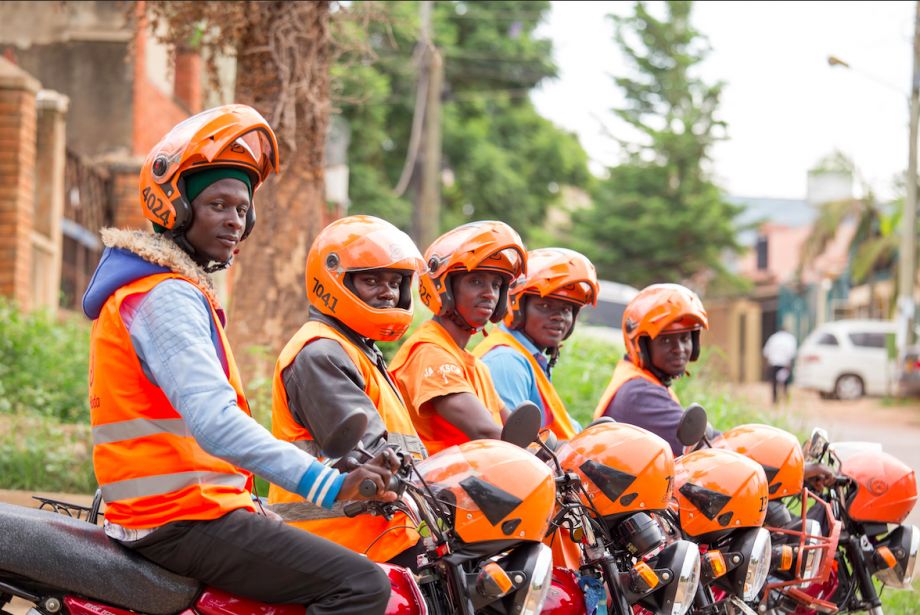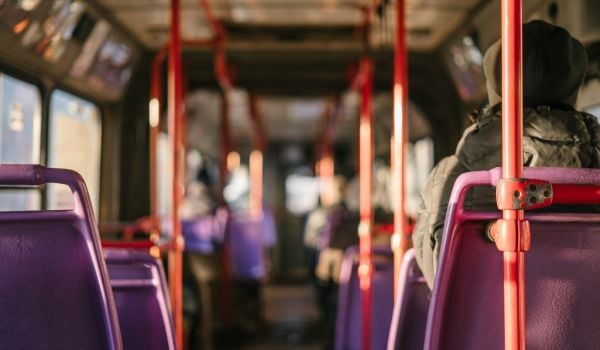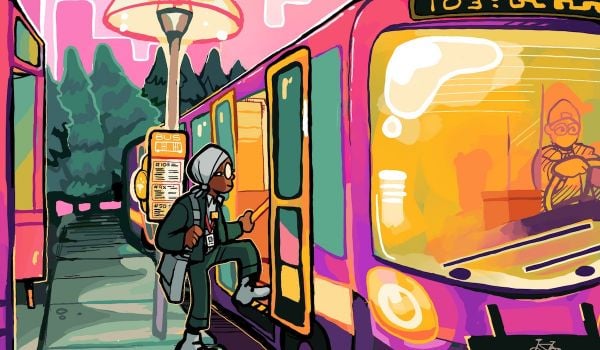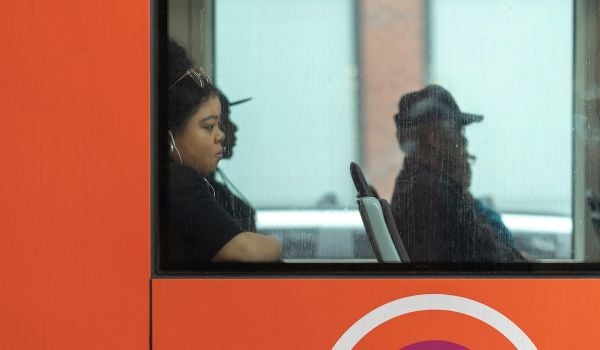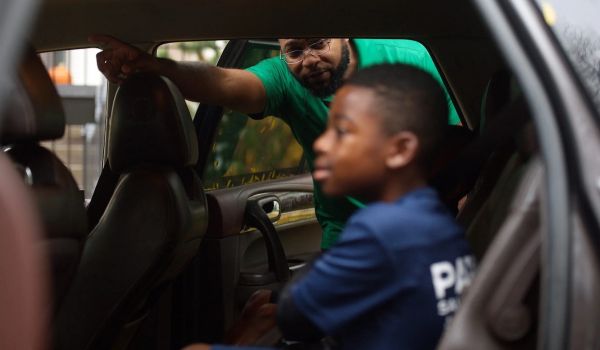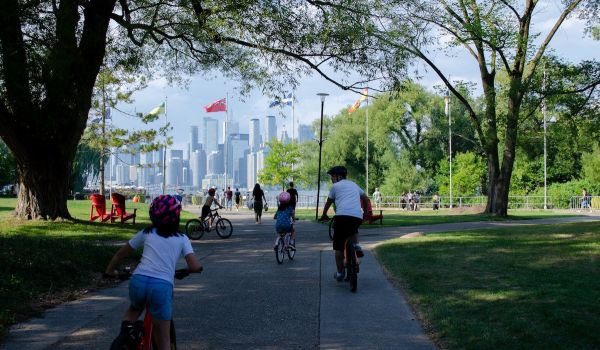This article was originally published by Rest of World, a nonprofit newsroom covering the effect of technology outside the West. Republishing rights remain with Rest of World.
It was only my second day in Kampala when I witnessed a commercial motorcyclist and his passenger swerve off the road near a busy city junction and tumble, almost in slow motion, into a street stall selling mobile phone cards. Fortunately, no one appeared hurt as they both quickly got up and brushed themselves down.
What was perhaps most surprising is that I only saw this one crash, given the sheer number of motorcycles — known locally as boda boda – which traverse Kampala’s congested roads — many times going in the wrong direction on busy streets. Depending on who you speak to, there’s anywhere between 800,000 to 1.2 million boda bodas in Uganda. It’s easy to believe, as they seemed to fill every crevice of traffic and side roads in this city of 3 million.
Since the mid-1990s, the East African country has seen the boda boda industry swell to become one of the most important employers of young men between the ages of 21 and 35, after agriculture. It has also led to a large informal economy and ecosystem, which is estimated to account for anywhere between 5% to 15% of the national GDP. Most of the bikes are imported from India, and dominated by two brands: TVS and Bajaj.
The flourishing boda boda sector explains why even though Uganda’s local tech ecosystem is much smaller than neighboring Kenya’s, Kampala is a bit of a niche as a test bed for digitizing public transport services with motorbikes and matatus (buses) among Africa’s tech ecosystems.
SafeBoda has been at the forefront of the push to digitize the mostly semi-informal transport ecosystems in most of Africa’s large cities. Launched in 2015, it set out to convert thousands of Kampala’s boda boda riders onto one digital platform, with a largely similar model to the ride-hailing models launched earlier in the West, but with motorcycles. At its peak, it had 25,000 drivers registered. As the name suggests, one of its unique early selling points was safety. By promising well-trained drivers, enforcing helmets be worn, and registering drivers and their identities, it provided a new layer of security and safety that was absent from the predominantly informal and chaotic market.
But even before SafeBoda, there was Tugende, an asset finance startup that launched in 2012, which has funded about 65,000 transactions. Its core product: a lease-to-own package for motorcycle taxi drivers in Uganda and Kenya. Tugende has raised over $50 million in equity and debt financing since the launch.
SafeBoda and Tugende’s early moves have encouraged different types of tech startups in sectors like fintech and agritech, but also others in the mobility space. “There’s been a lot of interest from investors in the space,” SafeBoda co-founder Ricky Papa Thomson told me in a meeting. “People want to succeed where others are succeeding.”
Tom Courtright, a transportation researcher who specializes in East Africa, said SafeBoda has helped raise awareness about Uganda’s tech potential. “SafeBoda definitely had a real role to play in the local ecosystem development with drivers, technicians, and engineers, some of whom have gone on to join Google and others,” he said. “They put Uganda on the map for investor types and that helped spur money going into other startups.”
But SafeBoda’s Thomson is quick to acknowledge that “succeeding” hasn’t quite been the story for the last two years for the boda boda sector. Uganda had put in place one of the continent’s toughest pandemic lockdowns, which lasted nearly two years. More importantly, the rules were stringently applied to prevent boda bodas from carrying passengers.
“The economy was already struggling before Covid-19 and then it got a lot worse,” said Michael Wilkerson, founder of Tugende. Early on in the lockdown, Tugende found itself having to support drivers who couldn’t earn a living, sending 25,000 Ugandan shillings ($6.50) to each driver to help buy food. It was a tough time for the company, as some of those drivers were unable to make finance payments on their bikes. Now, even with most restrictions removed, inflation has pushed fuel prices up nearly 85%. “Our customers are at the bleeding edge of the economic downturn here,” explained Wilkerson.
Like elsewhere, the lockdown accelerated the use of digital services, and as Rest of World has reported, SafeBoda quickly added more services including food delivery services, airtime purchase, cashless payments, mobile money transactions, and a savings scheme in which users are offered 10% annual interest on their savings. Tugende, which started out only offering motorcycle financing, now offers a range of asset financing options, including boats to refrigerators as well as insurance products.
“We didn’t plan to go this route yet, but the situation forced this,” said Thomson, referring to what is essentially a “super app” strategy. “Even the giants in the U.S. and elsewhere haven’t been able to make profits from ride-hailing.” SafeBoda’s revenue diversification bet is underpinned by developing its own mobile money ecosystem to encourage cashless transactions.
But there’s still very much hope that digital platforms can help disrupt — or, in fact, do the opposite, by helping organize and aggregate the semi-formal, privately-run public transportation options in fast-growing African urban areas. Easy Matatu, a three-year-old startup, is trying to do that with a simple app which allows suburban passengers to book a seat on the local 14-seater buses that come into central Kampala.
After starting, co-founder Andrew Lema and his team soon realized that digitizing the service might have been the easiest part of launching their service. “We had to convince both bus drivers and their bus owners to work with us, because they initially saw us as competitors,” Lema told me. “It took time to win them over.”
Eventually, both sets of stakeholders could see advantages to being able to operate the matatus with more efficiency. “Before now, drivers were mostly working with their intuition about where and when to run their routes but we have the data for them.” They’ve even been able to create new routes, said Lema, who is currently working on closing EasyMatatu’s seed funding round.
Yet, most of the innovation remains on two-wheels rather than four, when it comes to Ugandan mobility. One area that has been getting a lot of attention has been how to help build a more green transportation ecosystem, especially as Uganda sees fuel costs spiking. Zembo, a four-year-old startup, which raised $3.4 million from Toyota and CFAO Group’s Mobility 54 Investment, DOB Equity, and InfraCo Africa in November 2021, sells electric motorcycles via its lease-to-own program. It has also partnered with drivers on SafeBoda.
Co-founder Daniel Dreher said the company currently imports the motorcycle bodies from India, while it gets electric battery systems from China. They assemble the motorcycles at the small factory I visited on the outskirts of the city, where they also refurbish electric batteries for the bikes. The startup has built a network of solar-charging and battery-swapping stations spread through Kampala and neighboring towns, as it strives to fully earn its “green” credentials.
Zembo’s Dreher said the company has struggled recently, given the supply chain problems — particularly out of China. “It has been a big problem.”
Courtright said given the high costs of fuel in Uganda, there’s plenty of demand for batteries and electric motorcycles from drivers. “The problems are more technical,” he said, “but no one has done this before, and there’s still plenty of R&D to be done.”
Yinka Adegoke is Rest of World's Editor for Strategic Initiatives.

